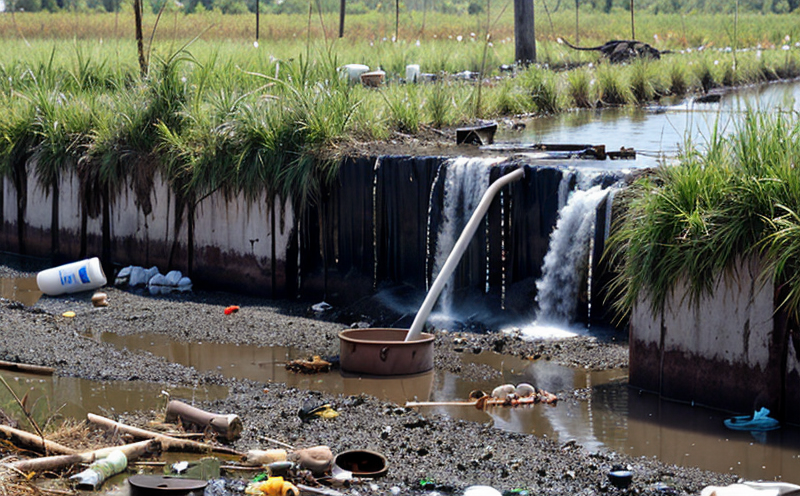Cosmetic Product Pollutant Testing
Understanding the environmental impact of cosmetic products is crucial in today's market. This service focuses on identifying pollutants that may be present in cosmetic products, ensuring they meet stringent regulatory requirements and do not pose risks to human health or the environment.
The process involves a series of comprehensive tests designed to detect potential contaminants such as heavy metals, pesticides, synthetic chemicals, and other harmful substances. Our laboratory adheres to international standards like ISO 17025 for quality assurance and employs advanced analytical techniques to ensure accurate results.
Our team works closely with clients to develop a tailored testing protocol that aligns with their specific needs and regulatory obligations. This includes determining the appropriate specimen preparation methods, selecting suitable analytical tools, and establishing acceptance criteria based on relevant standards.
We utilize state-of-the-art equipment and methodologies to perform these tests, ensuring reliable data collection and interpretation. Our expertise extends beyond just detection; we also provide recommendations for improvements or adjustments where necessary, helping our clients stay ahead of regulatory changes and consumer expectations.
By offering this service, we aim to support companies in maintaining high standards of quality control and safety within their supply chains. This not only enhances brand reputation but also contributes positively towards sustainable practices across industries.
In summary, our Cosmetic Product Pollutant Testing service provides comprehensive analysis aimed at identifying any pollutants present in cosmetic products through rigorous testing procedures compliant with recognized international standards. This ensures that both producers and consumers can trust the safety and environmental friendliness of these products.
Applied Standards
The tests conducted under this service are guided by several internationally accepted standards which ensure consistency, reliability, and accuracy in our results:
- ISO 17025: This standard sets the criteria for competence of testing and calibration laboratories. It ensures that all aspects of laboratory operations meet specified requirements.
- ASTM E1642: Used to determine the amount of free formaldehyde released by cosmetic products, which is important for assessing potential health risks related to exposure.
- EN 730: Provides specifications for the determination of heavy metals in cosmetics. This helps identify whether there are levels exceeding safe limits set forth by regulatory bodies.
- IEC 62321: Covers requirements for packaging used to contain cosmetic products, focusing on ensuring that materials do not contaminate the contents during storage or use.
These standards form a robust framework upon which we base our testing procedures, guaranteeing that each analysis adheres strictly to recognized benchmarks.
Benefits
The benefits of undergoing Cosmetic Product Pollutant Testing extend far beyond mere compliance; they offer numerous advantages that can significantly enhance business operations and consumer trust:
- Enhanced Safety: Identifying pollutants early allows for corrective actions to be taken promptly, safeguarding public health.
- Regulatory Compliance: Ensures that products meet all necessary legal requirements, avoiding potential fines or product recalls.
- Informed Decision Making: Provides valuable insights into ingredient composition and sourcing practices, enabling informed decisions about future formulations.
- Sustainable Practices: Helps companies adopt more environmentally friendly production processes by highlighting areas where improvements can be made.
- Consumer Confidence: Builds trust with customers who value transparency regarding the safety and quality of their products.
- Competitive Edge: Differentiates brands that take proactive steps towards sustainability from those that do not, potentially gaining market share.
- Risk Management: Minimizes liability issues associated with harmful ingredients by proactively addressing potential risks before they become major problems.
Overall, this service plays a vital role in protecting both consumers and producers while fostering an ethos of responsibility towards environmental stewardship.
International Acceptance and Recognition
The significance of Cosmetic Product Pollutant Testing extends globally due to its alignment with international norms and practices. Regulatory agencies worldwide recognize the importance of ensuring that cosmetic products are safe for consumers, especially regarding potential pollutants:
- European Union (EU): The EU has strict regulations concerning the presence of certain chemicals in cosmetics under its Cosmetics Regulation. Laboratories must adhere to these guidelines when performing pollutant tests.
- United States Food and Drug Administration (FDA): While not mandating specific pollutant testing, the FDA encourages manufacturers to conduct such analyses voluntarily as part of good manufacturing practices (GMP).
- China National Medicines Standardization Committee: China has implemented stringent measures regarding cosmetic ingredients, requiring thorough inspections for contaminants before market entry.
Besides regulatory compliance, there is growing consumer demand for products proven to be safe and environmentally friendly. By participating in international standards like ISO 17025, our laboratory secures its position as a credible provider of pollutant testing services recognized across borders.





